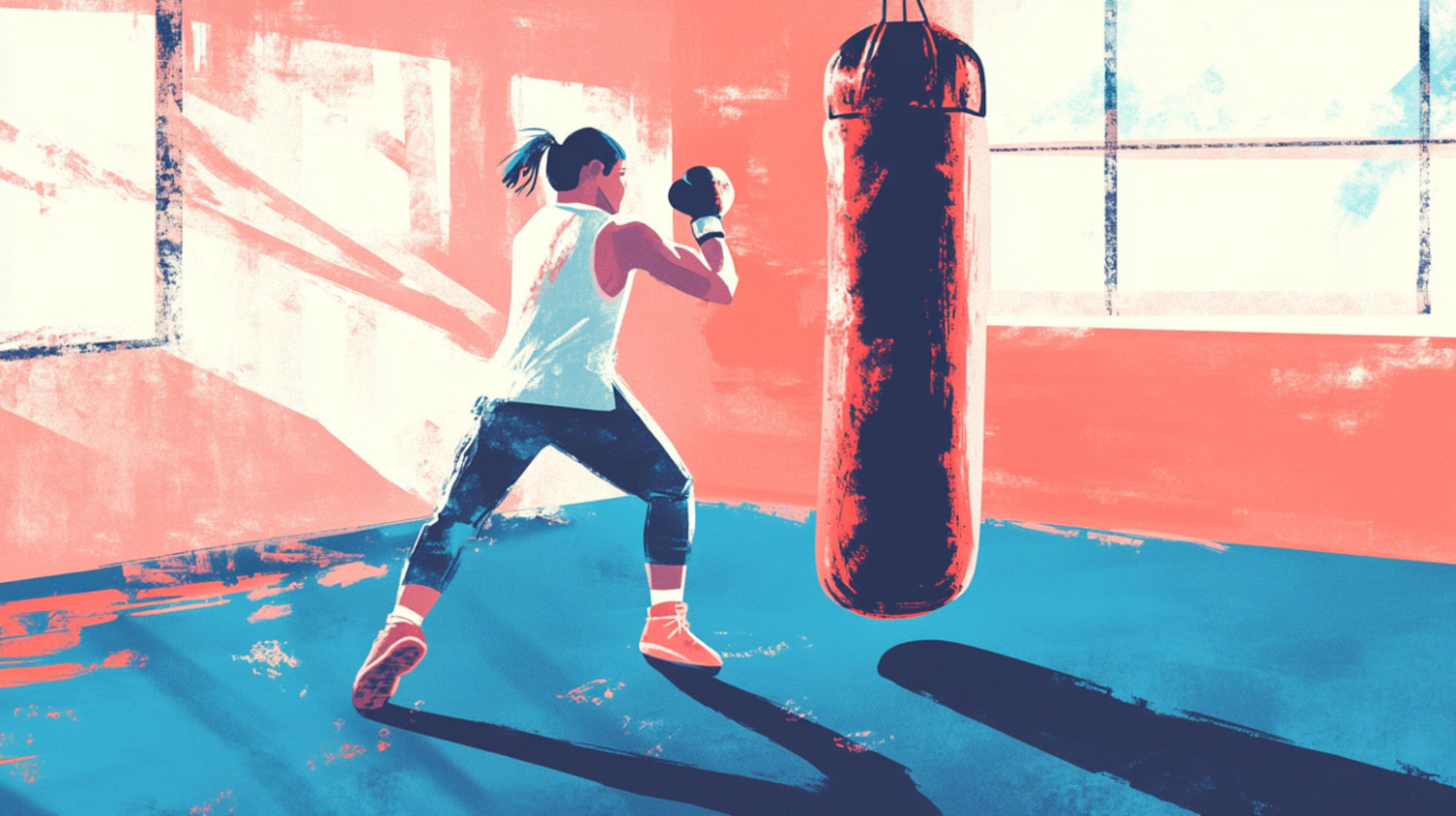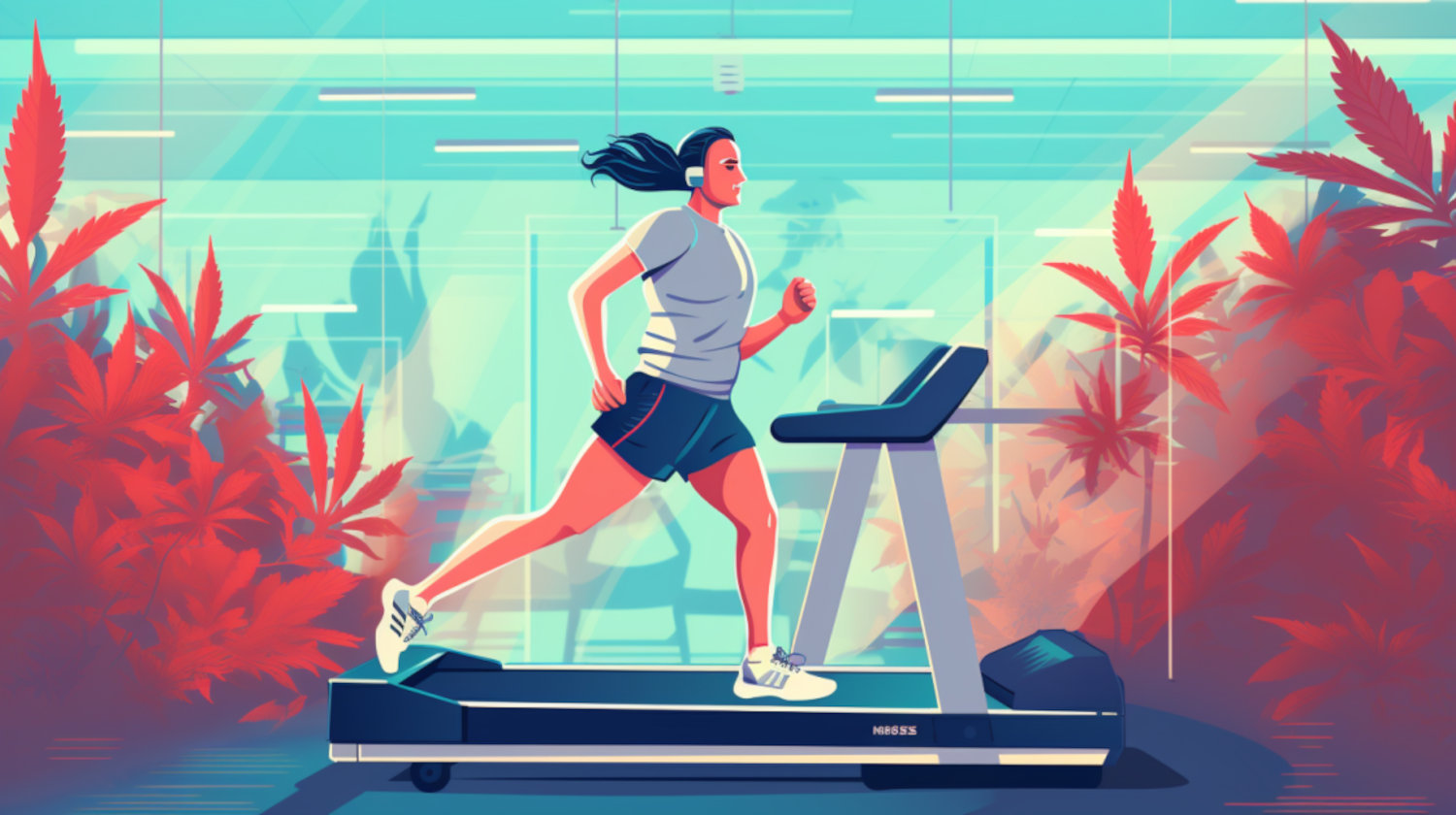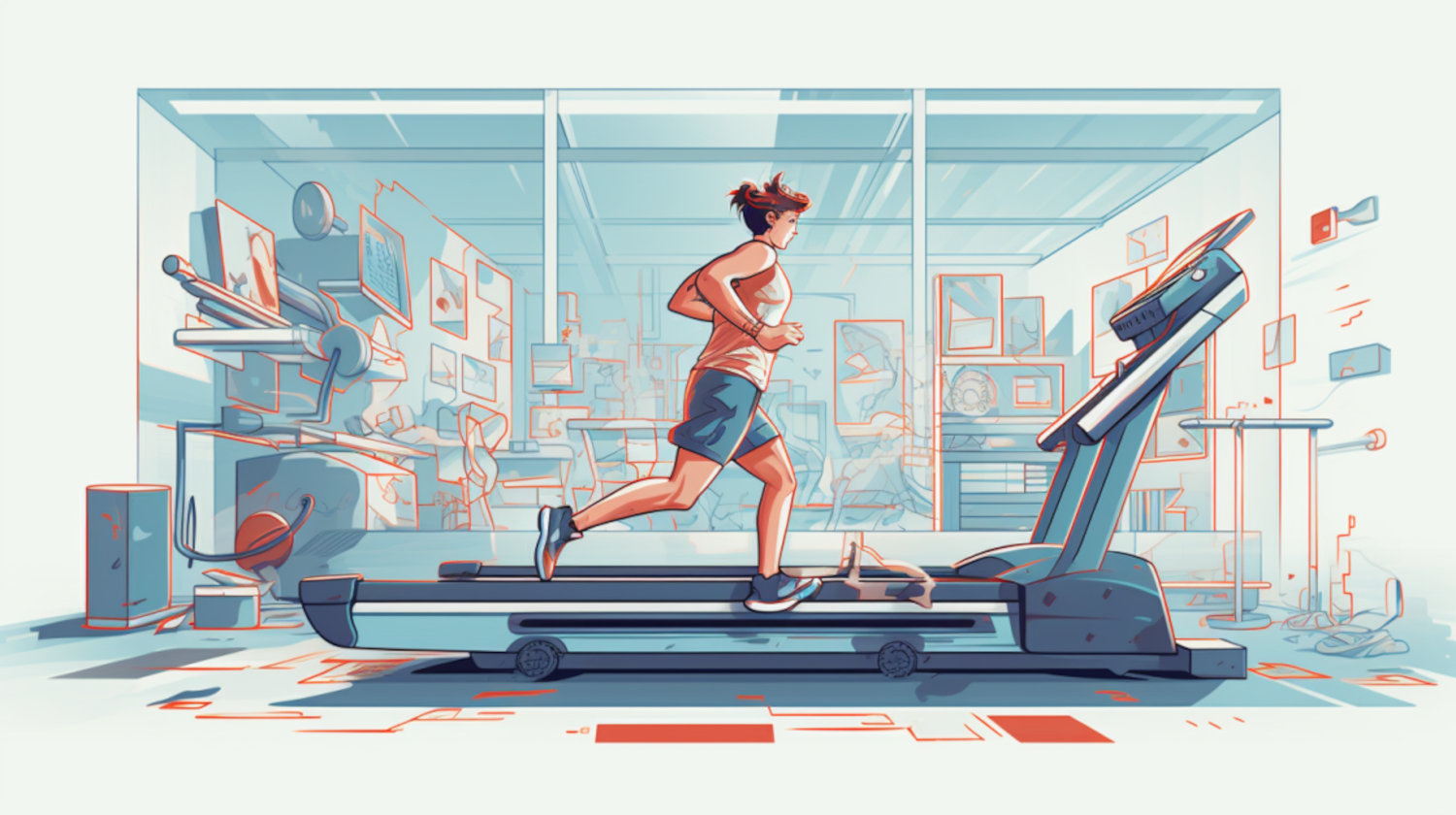In This Article
- Is Working Out High Safe?
- Can Using Cannabis Enhance Your Workout?
- Does Cannabis Aid in Recovery After a Workout?
- How to Use Cannabis Safely During a Workout
- Is THC or CBD Better for Fitness?
- How to Choose Cannabis Products for Working Out
- FAQs: Cannabis and Fitness, Answered
- How high is too high when working out?
- Does weed affect working out?
- Does weed decrease athletic performance?
- Does smoking weed affect testosterone?
- Which physiological effects of weed can impact your workout?
- Which psychological effects of weed can impact your workout?
- Always Check With Your Doctor Before Using Cannabis for Fitness
- References
Key Takeaways
- A growing number of people are using cannabis as part of their fitness routine.
- Some research suggests that cannabis may aid in motivation and recovery. However, it also may impair coordination and negatively impact performance.
- Talk to your doctor before using cannabis in your fitness routine for guidance on safety.
Cannabis and fitness might seem like an unlikely pair, but a growing number of pro athletes and everyday fitness enthusiasts say otherwise. Whether it’s to get in the zone, ease pain after a workout, or make movement more enjoyable, people are using cannabis to support their physical activity routines.1
A 2020 study of more than 50,000 athletes found that more than 25% of those surveyed used cannabis during exercise.2 With the growing popularity of cannabis, it’s important to understand how cannabis can affect your workout, alongside recovery, and more.
Is Working Out High Safe?
Using cannabis before or during exercise can be safe for most people, but it does have risks. Safe use depends on knowing your limits and choosing the right products and activities.
Cannabis can impair coordination and reaction time, especially at higher THC doses, which can increase the risk of injury.3 It may raise heart rate and blood pressure, particularly when smoked or vaped.4 Although scientific research on the safety of working out while high is limited, it is an increasingly common trend.
Can Using Cannabis Enhance Your Workout?
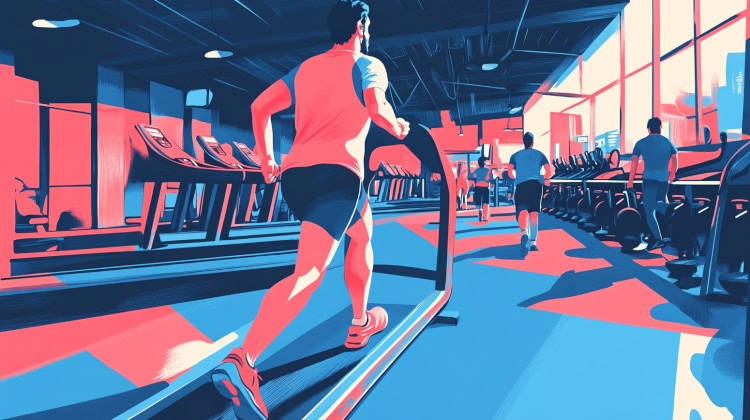
Some cannabis users report more enjoyable, focused, and longer workouts when using the plant before exercise. In states with legal access, cannabis use before physical activity is surprisingly common, and some people say it boosts motivation and helps them feel more connected to their bodies.1
Low doses of THC may enhance sensory awareness and reduce boredom during repetitive activities, such as running or cycling. It may also increase dopamine signaling, making motivated workouts feel more rewarding.5 However, higher doses can impair balance, timing, and decision-making, which may negatively affect performance.3
Does Cannabis Aid in Recovery After a Workout?
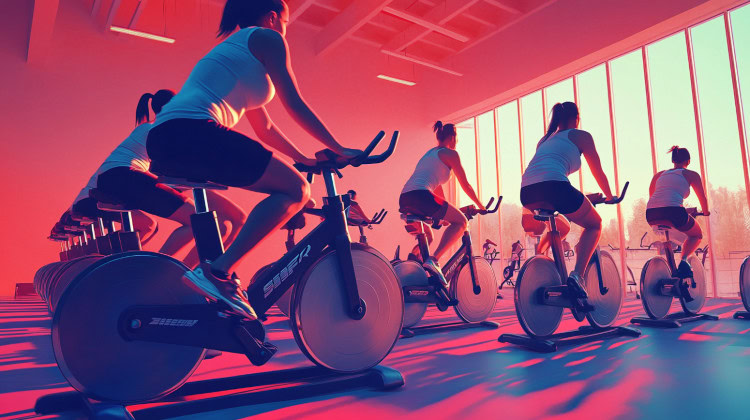
One of the most well-established possibilities of cannabis for fitness is its role in post-workout recovery.
Cannabinoids, including THC, CBD, and minor cannabinoids, may contribute to pain relief. Both CBD and THC have demonstrated anti-inflammatory and analgesic properties that may help reduce soreness and muscle pain after exercise.6
THC alleviates pain primarily by binding to CB1 receptors in the central nervous system, which modulate pain signaling. These CB1 receptors influence other neurotransmitter systems, including the opioid system and GABAergic signaling, but they are not directly 'connected' to them in a structural sense.7
CBD, in particular, is a popular choice for recovery. With no intoxicating effects, most can use it safely after their workout. It may lower inflammatory responses and could support muscle repair through its interaction with the endocannabinoid system. CBD may help muscles recover more quickly after exercise. It may also help with sleep, which aids in workout recovery.8
Some use CBD for weight loss as well. Some research suggests that CBD may support recovery and metabolism.9
How to Use Cannabis Safely During a Workout
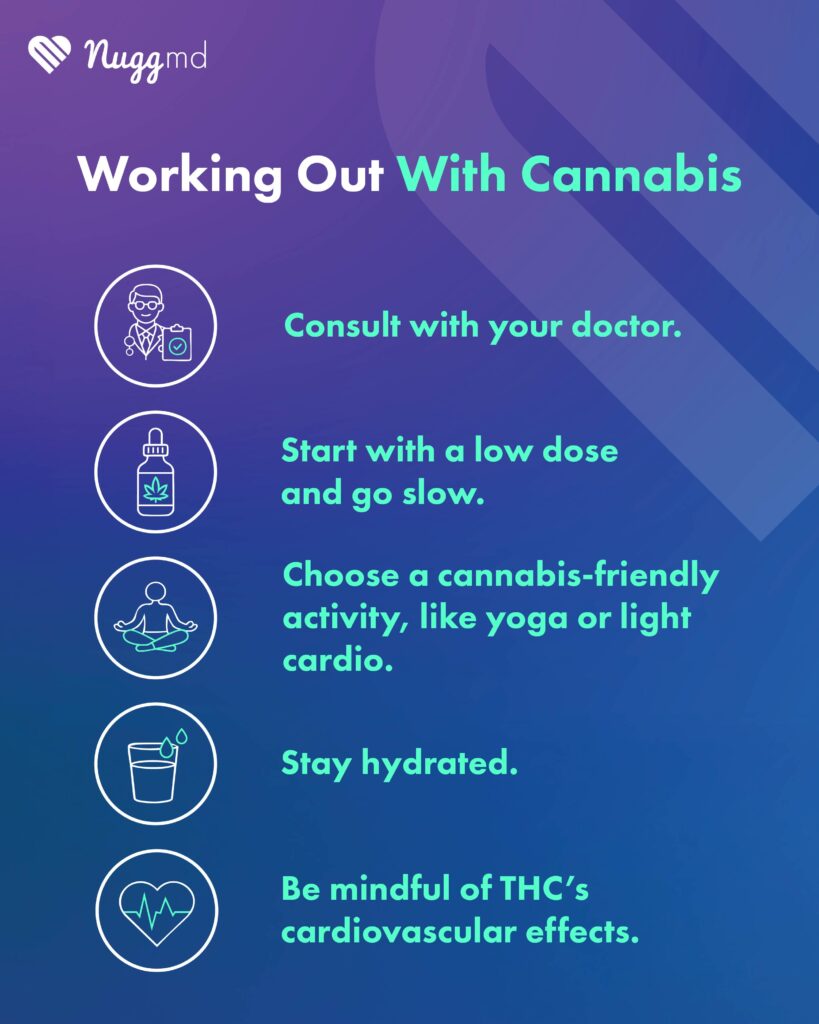
Before adding cannabis to your workout plan, consult your doctor to determine if you can use cannabis safely.
If you plan to incorporate cannabis into your fitness routine after getting approval from your doctor, start low and go slow. Everyone responds differently to cannabinoids, and too much THC could impair performance or make you feel lightheaded and anxious, a sign you may be too high.10 Some strains can make you tired, hindering the workout.11
Choose cannabis-friendly activities like yoga, or light cardio over high-risk sports or heavy lifting, especially if you’re new to pairing cannabis with movement. And always stay hydrated.
Be mindful of cannabis’ cardiovascular effects. THC can increase heart rate and cause palpitations, especially in new users or those with underlying health conditions.10 Cannabis can raise blood pressure and lower blood oxygen levels.1
Check with your healthcare advisor if you have any medical conditions before using cannabis during exercise.
Is THC or CBD Better for Fitness?
Both THC and CBD offer potential benefits and drawbacks, but they serve different purposes:
- CBD is frequently used for recovery, inflammation, and pain relief, without any intoxicating effects.8
- THC, in small amounts, may enhance mood, focus, and overall enjoyment during a workout.
One poll showed that 81.7% of people felt that cannabis positively affected their workouts. They noted longer exercise sessions, greater enjoyment, better recovery, and stronger motivation.1
That said, high doses of THC may interfere with physical performance. Participants in a study exhibited a decrease in early anaerobic power but were able to maintain their overall power output more effectively throughout the test.12
CBD may have anti-inflammatory properties, while THC may decrease pain through interaction with the brain’s GABA neurotransmitter system.13 Some find that a balanced product with both THC and CBD offers the best of both worlds by promoting motivation and aiding recovery afterward.
How to Choose Cannabis Products for Working Out
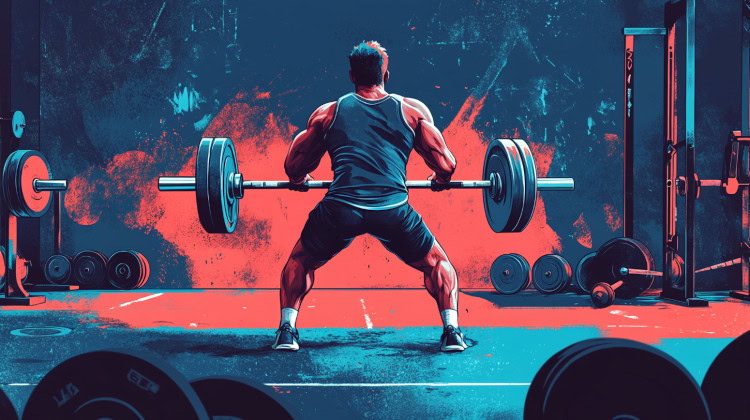
When selecting cannabis for fitness, consider your goal and preferred consumption method.
- If you want fast-acting effects, try vaping or a low-dose edible taken 30-45 minutes before exercise. Edibles, rather than vaping or smoking, may be best for those with respiratory issues.
- For recovery, tinctures, capsules, or topicals with CBD may be longer-lasting.
- Products high in THCV may offer an energy boost without the munchies. Patients suggest specific strains high in THCV help suppress their appetite. Although cannabis is not a proven weight loss aid, studies show cannabis users may have a lower-than-average BMI (body mass index).14
While plant cannabis has few calories, edibles and their ingredients can rack up calories when consumed, so choose the right product if you're worried about weight maintenance.
FAQs: Cannabis and Fitness, Answered
Is it good to work out while high? Some people genuinely enjoy it, but it's important to check with your doctor first. Some studies show that working out while high can enhance focus, enjoyment, and motivation when used in moderation.1
How high is too high when working out?
If you feel dizzy, disoriented, or overly anxious, you may have overdone it.3 If your doctor says it's ok, start with a microdose and see how you feel.
Does weed affect working out?
It can have a positive or negative effect, depending on the dosage, timing, and the activity. Everyone’s experience varies. Small amounts may boost engagement; too much can slow you down.5
Does weed decrease athletic performance?
Chronic or excessive use may reduce power output and coordination 12
Does smoking weed affect testosterone?
Evidence is mixed. Some older studies suggest a potential reduction, but more recent data are inconclusive, especially for occasional users.15
Which physiological effects of weed can impact your workout?
Increased heart rate, dizziness, delayed reaction time, and changes in blood pressure can affect your workout.4,11
Which psychological effects of weed can impact your workout?
Cannabis may improve focus, elevate mood, or reduce stress, but it can also cause anxiety or cognitive slowing, especially in higher doses.3
Always Check With Your Doctor Before Using Cannabis for Fitness
Cannabis isn’t a shortcut to fitness, but some find it a helpful companion. Whether you’re using it for motivation, recovery, or simply to make your workout more enjoyable, understand your own limits and goals and work closely with your physician. If your doctor approves, stick with low doses, choose the right product, and always listen to your body.
References
- YorkWilliams SL, Gust CJ, Mueller R, et al. The New Runner’s High? Examining Relationships Between Cannabis Use and Exercise Behavior in States With Legalized Cannabis. Frontiers in Public Health. 2019;7. doi:https://doi.org/10.3389/fpubh.2019.00099 ↩︎
- Docter S, Khan M, Gohal C, et al. Cannabis Use and Sport: A Systematic Review. Sports Health: A Multidisciplinary Approach. 2020;12(2):189-199. doi:https://doi.org/10.1177/1941738120901670 ↩︎
- Kroon E, Kuhns L, Cousijn J. The short-term and long-term effects of cannabis on cognition: recent advances in the field. Current Opinion in Psychology. 2021;38:49-55. doi:https://doi.org/10.1016/j.copsyc.2020.07.005 ↩︎
- Page RL, Allen LA, Kloner RA, et al. Medical Marijuana, Recreational Cannabis, and Cardiovascular Health: A Scientific Statement From the American Heart Association. Circulation. 2020;142(10). doi:https://doi.org/10.1161/cir.0000000000000883 ↩︎
- Gillman AS, Hutchison KE, Bryan AD. Cannabis and Exercise Science: A Commentary on Existing Studies and Suggestions for Future Directions. Sports Medicine. 2015;45(10):1357-1363. doi:https://doi.org/10.1007/s40279-015-0362-3 ↩︎
- Vučković S, Srebro D, Vujović KS, Vučetić Č, Prostran M. Cannabinoids and Pain: New Insights From Old Molecules. Frontiers in Pharmacology. 2018;9(9). doi:https://doi.org/10.3389/fphar.2018.01259 ↩︎
- Safi K, Sobieraj J, Michał Błaszkiewicz, Żyła J, Salata B, Tomasz Dzierżanowski. Tetrahydrocannabinol and Cannabidiol for Pain Treatment—An Update on the Evidence. Biomedicines. 2024;12(2):307-307. doi:https://doi.org/10.3390/biomedicines12020307 ↩︎
- Rojas-Valverde D. Potential Role of Cannabidiol on Sports Recovery: A Narrative Review. Frontiers in Physiology. 2021;12. doi:https://doi.org/10.3389/fphys.2021.722550 ↩︎
- Wiciński, M., Fajkiel-Madajczyk, A., Kurant, Z., Gryczka, K., Kurant, D., Szambelan, M., Malinowski, B., Falkowski, M., Zabrzyński, J., & Słupski, M. (2023). The Use of Cannabidiol in Metabolic Syndrome—An Opportunity to Improve the Patient’s Health or Much Ado about Nothing? Journal of Clinical Medicine, 12(14), 4620. https://doi.org/10.3390/jcm12144620 ↩︎
- Linneberg A, Jacobsen RK, Skaaby T, et al. Effect of Smoking on Blood Pressure and Resting Heart Rate: A Mendelian Randomisation Meta-Analysis in the CARTA Consortium. Circulation Cardiovascular genetics. 2015;8(6):832-841. doi:https://doi.org/10.1161/CIRCGENETICS.115.001225 ↩︎
- Saugy M. Cannabis and sport. British Journal of Sports Medicine. 2006;40(Supplement 1):i13-i15. doi:https://doi.org/10.1136/bjsm.2006.027607 ↩︎
- Lisano JK, Flores VA, Kisiolek JN, Stewart LK. Regular Use of Cannabis in Female Athletes Is Associated With a Reduction in Early Anaerobic Power Production. Journal of Strength and Conditioning Research. 2022;Publish Ahead of Print. doi:https://doi.org/10.1519/jsc.0000000000004297 ↩︎
- Henshaw FR, Dewsbury LS, Lim CK, Steiner GZ. The Effects of Cannabinoids on Pro- and Anti-Inflammatory Cytokines: A Systematic Review of In Vivo Studies. Cannabis and Cannabinoid Research. 2021;6(3):177-195. doi:https://doi.org/10.1089/can.2020.0105 ↩︎
- Alshaarawy O, Anthony JC. Are cannabis users less likely to gain weight? Results from a national 3-year prospective study. International Journal of Epidemiology. 2019;48(5). doi:https://doi.org/10.1093/ije/dyz044 ↩︎
- Thistle JE, Graubard BI, Braunlin M, et al. Marijuana use and serum testosterone concentrations among U.S. males. Andrology. 2017;5(4):732-738. doi:https://doi.org/10.1111/andr.12358 ↩︎
The information in this article and any included images or charts are for educational purposes only. This information is neither a substitute for, nor does it replace, professional legal advice or medical advice, diagnosis, or treatment. If you have any concerns or questions about laws, regulations, or your health, you should always consult with an attorney, physician or other licensed professional.

